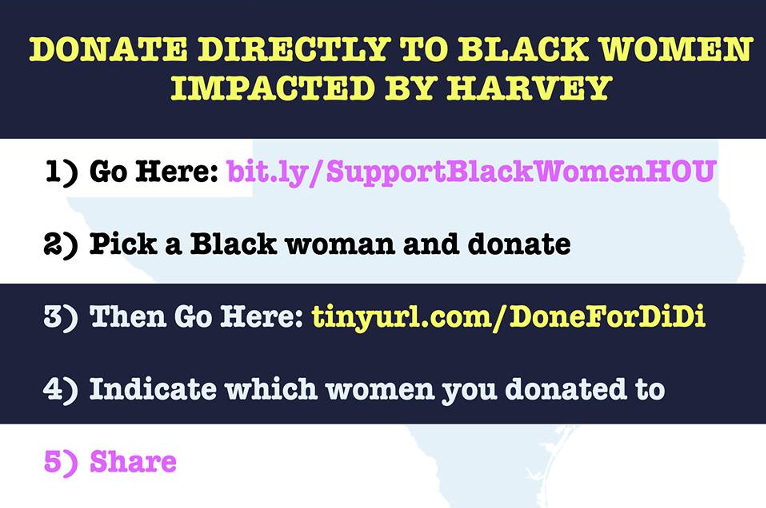It started with an idea that may seem obvious to communities in crisis.
Why can’t resources be distributed instantly to families in need, instead of being donated to large charities in the hopes aid will eventually filter down to individuals?
That’s the challenge doctor and activist Roni Dean-Burren of Houston set out to solve this week, in the wake of Hurricane Harvey. Her hope was to use popular money transfer apps (like PayPal, Venmo, and Square Cash) to assist the most marginalized and vulnerable demographics impacted by the massive category 4 storm.
On Aug. 28, Dean-Burren took to her Facebook account encouraging Black women who have been displaced by Hurricane Harvey to create an account with at least one digital money transfer app. “We ain’t doing Red Cross,” she wrote (a not-so-subtle jab at the questionable disaster relief charity), “We want to give DIRECTLY to Black women.” Then, she created an online form where displaced applicants could submit their identity and payment information for review. Dean-Burren then used social media and mutual networks to vet and determine if displaced applicants fit the criteria to be eligible. That criteria was simply that applicants were Black women in the Houston area, impacted or displaced by Harvey.
Applications started rolling in.

By Wednesday morning, Dean-Burren had created and posted a list of nearly 100 Black women in serious need. The list began circulating on social media with the hashtag #SupportBlackWomenHOU. Initial reactions were exceedingly positive, but before long a handful of obstacles presented themselves.
For starters, there was no way to keep track of who on the list was receiving donations, and who wasn’t. Also, potential donors seemed somewhat overwhelmed by the sheer number of recipients to choose from. Without a progress bar, goal, or way to track donations, it wasn’t easy to gauge the effectiveness of the campaign. The list itself, however, remained incredibly valuable, since it allowed donors to identify people in immediate need—something mainstream charitable organizations currently don’t do.
That’s where DiDi Delgado—the senior collaborative organizer with Black Lives of Unitarian Universalism, who recently co-organized last month’s massively successful Fight Supremacy march in Boston—decided to step in. Delgado reached out to Dean-Burren to see if she could employ her social media and platform expertise to enhance the existing vision and groundwork of the campaign.
Dean-Burren agreed, and Delgado got to work.
The major component Delgado felt was missing was a way to track donations and provide feedback. She set up a simple online poll to emulate the donor confirmation system used in her other fundraising initiatives.
The poll was fit with security protocols to cut down on fraudulent or malicious inputs and to prevent automated voting from a singular IP address. The honor system poll allowed donors to confirm they’d donated and also indicate which Black women received funds on their behalf. To make choosing from the list easier, Delgado suggested donors pick women who shared the same first initial as their mother—a simple ask that made the selection process less daunting. An instructional graphic was produced, and by 7 Wednesday evening a Facebook post was published that quickly went viral.
Delgado, who is also a member of Black Lives Matter Cambridge, used the poll to keep track of donations—which were set at a suggested minimum of $20 per recipient. Donors and recipients, however, confirmed that many individuals were donating more. As the funds began to pour in, Dean-Burren was able to update and maintain the list accordingly to keep up with the new demand. The data from Delgado’s confirmation system helped both women determine who was receiving funds and which payment links were inactive or required upkeep. And using the suggested $20 donation and poll data, they were able to determine roughly how much money was being redistributed.
Within an hour, over $3,000 had been raised. That early success pushed participants to donate and share even more. Feedback from Black women receiving funds while in crisis shelters around Houston started rolling in via Facebook, Twitter, and email. The personal confirmation that women were receiving cash donations directly only heightened the frenzy. By midnight, over a thousand donations had been submitted and confirmed, totaling at least $20,000.
As of mid-day Friday, donations have exceeded $35,000.
The implementation and grassroots success of this campaign is unprecedented. As more Americans have taken to the sharing economy to bypass conventional resource consumption, it seems charitable donations may be next on the list. New donation alternatives, such as Safety Pin Box, have proven that time-tested charity models are becoming outdated. The impact of Harvey will undoubtedly be felt for many years to come, but the quick thinking of Black women activists has already helped to ease the burden for thousands of households—and counting.
Delgado says, as education surrounding the pervasiveness of white supremacy continues to come to light for mainstream Americans, perhaps Black women will finally get the much needed and long overdue support they deserve.
This story has been adapted for YES! Magazine from the original blog post.





